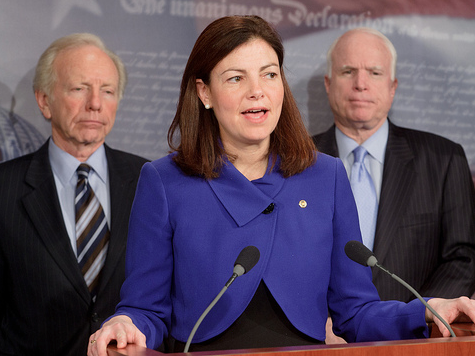Sen. Kelly Ayotte (R-NH) is the unsung heroine of the foreign policy debates of the past few months. A Tea Party candidate who was elected in the 2010 wave, Ayotte has been one of the most reliable voices on the Benghazi attacks, the Hagel nomination, and the prosecution of terrorists. She has worked with Sens. John McCain (R-AZ) and Lindsey Graham (R-SC)–without joining their withering attacks on the party’s libertarian wing.
In the Hagel confirmation process, though much of the mainstream media’s attention focused on the aggressive questioning by McCain, Graham, and Sen. Ted Cruz (R-TX), it was Ayotte’s line of questioning that was most effective in exposing Hagel’s position on Iran, which is the most pressing national security challenge the nation faces at the moment. Ayotte eschewed theatrics and flash for patient and yet penetrating questions.
In one particularly revealing exchange, Ayotte pinned Hagel down on his opposition to a “military option” on Iran:
Ayotte: Can you help me understand, when you went to Islamabad, Pakistan in 2006, you said at that time that a military strike against Iran, an military option, is not a “viable, feasible or responsible option.” And it strikes me that what you’re saying about the military option now and even–it seems inconsistent with that statement. And why would you make that statement in Pakistan that it’s not a “viable, feasible or responsible option” in light of your statement today that you do, I have, and I strongly agree that a military option should be on the table?
Hagel : That statement was made in a context of all options regarding Iran. And Pakistan was where I was at the time. And the larger context of that was nuclear powers, which certainly Pakistan is part of that club. And not unlike what Secretary Gates said about a strike on Iran, my point was that this would not be a preferable option. There would be consequences to this option. Things would happen as a result of it. If we could find a better option, a better way to deal with Iran to assure they do not get nuclear weapons, then we’re far better off. That was the context of that statement.
Ayotte: Senator Hagel, I know that my time is up and I know we’ll have an opportunity for a second round of questions, but as I see your quote it didn’t say “preferable option;” it said, was not a responsible option.
During the debate over UN Ambassador Susan Rice’s potential candidacy as Secretary of State, Ayotte joined McCain and Graham in stressing their objections to Rice over her role in spreading the story that the Benghazi terror attack on Sep. 11, 2012 had been a protest over an anti-Islam video. In an effort to characterize opposition to Rice as racist and sexist, the president and his party pointedly ignored Ayotte’s role in the debate.
Ayotte refused to take the bait, remaining focused on the issues at hand. Her remarks after a meeting with Rice–“I want to say that I’m more troubled today”–marked a turning point, after which Democrats knew that Rice’s candidacy would be a losing proposition.
In her remarks at the Conservative Political Action Conference this morning, Ayotte touched on foreign policy but returned to the domestic issues that were the theme of her election campaign in 2010:
Let me tell you about some of the things that keep me up at night. Too many Americans are out of work. Federal regulations are strangling businesses. Obamacare is increasing health care costs and stopping so many of those businesses from hiring. And I come from a small business family. I know what that’s like. How hard the small businesses work. We have a broken tax code and the president and Senate Democrats, they just want to keep increasing taxes, making it harder and harder, for our small businesses to hire and grow and put people to work in this country. Our nation is drowning in debt. We have had four straight years of trillion dollar deficits.
In 2012, Ayotte was considered a long-shot contender to be Mitt Romney’s running mate. While that may have been premature, it likely portends Ayotte’s future. She is one of the few conservatives who is fluent in both the Tea Party’s constitutionalism and the hawkish policy prescriptions of the national security wing of the Republican Party.

COMMENTS
Please let us know if you're having issues with commenting.